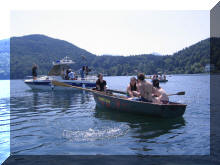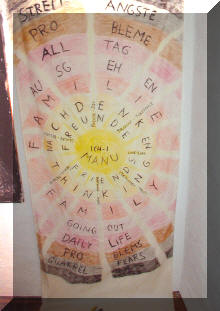Nili Gross, Israel
This article about "identity project", which was conducted in the 2004
school year, was written four months after the project ended. With four
months' perspective, insights have been gained that were not visible during
the project or right after it ended. I assume that as time passes – every
participant, teachers and students alike, will have more insights into the
process, and the influence that the project has had on them.
There is no doubt that the project was fulfillment of a dream for me, and
I know that it was so for my co-entrepreneur, Mrs. Evelyn Bohmer as well.
What moves me to this day is the fact that both of us, sitting on two
different continents, conjured this vision on our own. Without even knowing
each other, our dreams joined and became one, and together we made it come
true, in a way that sometimes seems as if it all happened by chance. The
road we took until the project was finally on its way was long and paved
with obstacles; many joined us and many deserted us to walk alone on a path
that was long and tedious. What kept us from giving up was the
uncompromising faith that we were on the right road, and that we wanted to
take a part, even a small one, in touching a child's soul.
Education touches the soul. Education does not mean dictating faith or a
given doctrine, but rather making a person ask questions that don't
necessarily have answers, and knowing that it is his duty to always ask
questions and to doubt. Doubting gives an option to confront reality, which
sometime seems unchangeable. That's why education is, to my mind, the
turning of children into grown men and women who are critical and aware of
what is happening around them It was satisfying that, at last, a wonderful
staff from Austria and Israel was assembled.
The team was composed of teachers from Alpen Adria, Ibn Sinna and Ramot
Hefer schools, and some professionals. Moreover, a filming crew who were
making a documentary film about the project joined us, and although they
observed us from the outside or through a camera lens, they became an
inseparable part of the project's entity.
The choice of the three different youth groups was not coincidental: The
meeting between a group of Jewish-Israelis, Arab-Palestinian-Israelis who
live between Israel and the Palestinian Authority, and Austrian youth- who
live on the boarder of Austria and Slovenia, was a meaningful meeting, on
which I will elaborate later.

Samach, Manuela, Alex |

Boat Race on the lake |
The theme and name of the project was "Peace Camp" - a process of
researching identities. The process was divided into two parts. The first
part, in which every team worked separately with a teacher-guide on the
research of personal, family and group identity. The second part included a
meeting of the different groups in a ten-day camp in Austria, where the
results were processed through different arts: dance, music, drama, and
plastic art.
During the camp the participants got to know the Corinthian County, where
we were hosted, through exploration of nature, geography and history-study
activities. Debates about identity, politics and history were conducted, and
the processing of it all was held in a psychological-analytical session at
the end.
Why was the identity research chosen? We carry many diverse identities
throughout our lives. To some we are born and they are unchangeable- like
gender, family and ethnic identities, and some are given to us after birth,
without our personal choosing, such as religious and national identities.
Most of the communities in which we live do not allow a real search or doubt
in regards to identities, because the change of identity threatens their
stability. But without real exploration into our identities, we can never
really fulfill ourselves in a satisfying way. We have to understand that we
usually can't choose most of our identities, so we have to learn how to
balance them.

Practicing for the show's dance
Right:
Manuela's self identity art work |
 |
Part understanding our identities and the way they are chosen happens
when we meet other identities, different from our own. Sometimes we build
our identity by negating a different one. In this case, casting a negative
shadow on a different identity gives a sense of meaning to our identity and
this creates a bond between the people who carry it. In this way we sometime
de-legitimize the culture of the different identity - the language, music,
colors, and clothing. These topics were discussed in the different debates
throughout camp: The Austrians spoke of the struggle the citizens of
Slovenian origin had undergone, wanting the street signs to be written also
in the Slovenian language, alongside the German language; and we discussed
the fact that Arabs in Israel speak Hebrew, whereas the Jews do not speak
Arabic. (The Jews learn Arabic only for the reason of spying on the enemy,
and not for communicating and getting to know the Arabs.)
Many important questions were raised concerning the identities we carry:
Do we live in peace with all of them? Are we capable of denying some of them
and if so, are others willing to accept this denial? The holocaust was
discussed in this context: When Jews were murdered because of their Jewish
identity, even though some of them had no connection to it and some even
denied it. Another topic was associated with the holocaust – the
understanding that the Austrian group was composed of a third generation
holocaust perpetrators. The question "how much guilt do you carry?" was
raised. The understanding that the Jewish group was composed of third
generation holocaust survivors raised the question of the "victim" identity,
to which they are attached, alongside with the "aggressor" identity they
find hard to admit. Both the Austrian, Jewish and Arab groups understood
that the holocaust plays a crucial part in the Israeli-Palestinian conflict,
and that it has an effect on the Israeli's lack of trust in the Palestinians
to this very day.
 |

Playing music in the free time
Left: Planting an olive tree |
The question of how reliable is media-information in wartime was raised,
as well as the reliability and veracity of different topics learned in
school. It seemed to the Austrians that they knew Israel's history better
than the two other groups, even though these groups live in Israel.
There is no doubt that there is much that can be added about the
important and interesting processes that came up during camp. My priority is
not necessarily giving answers to these questions, but rather the asking of
the questions, even the ones that were left hanging in the air after all the
debates and activities were over. There is no doubt that these questions
keep working their effects on the project's participants, long after the
project's end.
A personal dynamic, which is not less important (and maybe even more),
was created between the participants, beyond the working hours. The
interaction between them, in the little free time they had, was rich, loving
and respectful. The social connections and friendships that were formed will
not soon, if ever, be forgotten. Even three months after the end, the
participants still keep in close touch. It is understood that the Arab
group, who have no Internet connection, are having a harder time keeping in
touch, but those who can - do so.
The participants learned about the big differences between the groups,
which stemmed from the different identities, but they also learned about
what is common to them all as human beings. The social connections were
built because of their ability to see beyond their differences, and because
of the recognition that difference is not necessarily negative. Many and
different identities create a richer and more beautiful reality, one which
does not need to be threatening.
There were unexpected things - things that we needed to handle on a
day-to-day basis. It turns out that the most basic needs like food and
hygienic habits, which are also different due to cultural conditioning,
presented difficulties, much like the other activities. We needed to
overcome these differences in order to deal with the spiritual needs of the
soul. We also dealt with perceptual and cultural differences between staff
members, who had to function as guides and leaders of the project and also
solve the problems amongst themselves. Identity differences, it turns out,
touch every part and quality of our lives, and dealing with them isn't easy
when we meet people who are different from us. We overcame these problems as
well, and the evidence for this is our strong will to keep on working
together in the future.
This project has touched the hearts of 26 teenagers in all, but in my
eyes each and every one of them is a world of its own. I aspire and hope to
keep conducting more projects such as this one in the near future, with new
groups and also the old ones. Today, after the project has proved that we
can make dreams come true, even when on the surface it seems impossible, I
am full of hope that we can continue this important educational work. I hope
that others will also believe in our purpose and agree to help us in the
future.
I thank my loyal partner, Mrs. Evelyn Boehmer-Laufer, The President of
"Hadassah-Austria", Mrs. Susanne Shaked, and her husband, Prof. Dr. Josef
Shaked, who guided the psychoanalytical large-group-sessions, with all my
heart. I thank the staff of teachers from the different schools for their
efforts, their hard work and their undiminished faith in the success of the
project. I thank the artistic team, the participants' parents who put their
trust in us, and the wonderful participants who are the reason the project
succeeded more than anyone expected. I thank the documentary film production
team - the producer, the director, the cameraman and the soundmen, who
became a wonderful part of our daily routine in camp, and of course the
generous supporters of the project - Karl Kahane Stiftung, the Austrian
Ministry of Education and others.